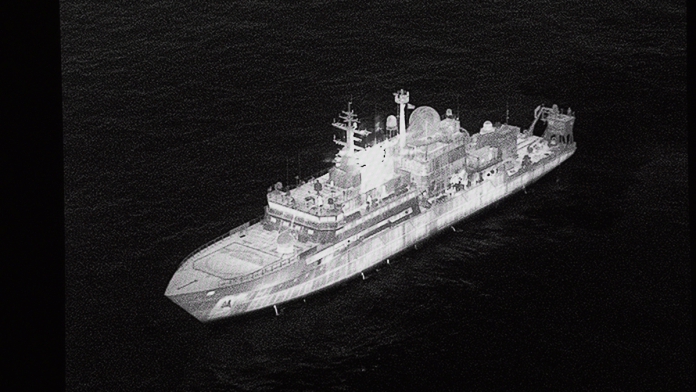A Russian spy ship on the edge of UK waters pointed lasers at British pilots for the first time in a “deeply dangerous” escalation, Defense Secretary John Healey revealed as he warned of military options if the vessel travels further.
Yantar — designed to gather intelligence and map Britain’s undersea cables — entered UK wider waters over the last few weeks and is currently located north of Scotland, Healey told a media briefing on Wednesday in Downing Street. It was the second time this year that the ship had been deployed to UK waters.
Healey said a Royal Navy frigate and maritime patrol aircraft will track the vessel and Britain stands “ready” if it travels south this week. The light lasers appeared designed to distract pilots flying British surveillance aircraft.
“Anything that impedes, disrupts or puts at risk pilots in charge of British military planes is deeply dangerous,” Healey said.
The vessel was in UK waters between Nov. 5 and Nov. 11. Earlier this year, the same ship entered British waters about 45 miles (72 kilometers) off the coast, leading the UK to deploy an attack submarine to deter it.
Healey traveled to Plymouth in southwest England after the announcement for a tour of Helsing’s new “resilience factory,” where the defense technology company is building submarine hunters designed to police undersea cables from threats like the one revealed Wednesday.
The idea is that hundreds of autonomous gliders, about 2 meters long, and cheaper and quicker to make than submarines, could be placed between Scotland and Iceland and alert navies to any threat, allowing them to deploy much more expensive attack submarines if necessary.
The company will soon begin testing with the Royal Navy in Scotland, though no commercial decisions have been made yet on large-scale contracts with the defense ministry. The UK is looking to build an Atlantic Bastion to bolster its defense against underwater threats, with the potential to deploy it alongside other NATO partners.
EU Weapons Fund
Healey also indicated that the UK was willing to walk away from negotiations to enter the European Union’s flagship defense fund, after it rejected a request for as much as €6.75 billion ($7.8 billion) in contribution to join.
British companies would stand to benefit if the UK is able to negotiate access to a €150 billion program that allows member states to borrow money to invest in defense capabilities, with expenditure allowed on equipment whose components mainly stem from within the EU, Ukraine, and EEA-EFTA nations.
Healey said the EU originally promised a deal on SAFE could be done within weeks of a UK-EU defense partnership brokered in May. He said the UK still wants a deal and is willing to pay a “fair” contribution” but that Britain would continue to do deals with EU nations “in or out” of the fund.
(Reporting by Ellen Milligan. With assistance from James Woolcock.)
Disclaimer: This report is auto generated from the Bloomberg news service. ThePrint holds no responsibility for its content.
Also read: Why a ship carrying Russian oil shifted its cargo off Mumbai’s coast






